Confessions of Croatian Teachers: "Student Stole, Father Threatens to Get Me Fired."
April 30, 2023 - The relationship between teachers and parents has certainly changed over the last few decades. Some worrying findings by Matea Celebija of Index.hr.
After the first major survey in Croatia on the relationship between parents and teachers showed that more than 93 percent of educators encountered inappropriate behaviour from the parents of their students, we spoke to primary and secondary school teachers who told us about their unpleasant experiences with parents.
All of them experienced some kind of accusation or threat from their parents, and some both. They say that parents often yell at them, accuse them of their children's bad grades, and often threaten them with calling for an inspection and even firing them. Given that the inspection has so far not found any irregularities in their work with students, the teachers we talked to believe that, as in other countries, there should be penalties for unfounded and false reports by teachers.
Author of the study: "There are no longer norms of behaviour in the relationship between parents and teachers"
The research in which 2,811 teachers participated was carried out as part of the Pulse of the School project, which was jointly initiated by a team of scientists from the Faculty of Philosophy of the University of Zagreb and the textbook publisher Profil Klett with the support of the Croatian Teachers' Union (SHU) and the Independent Union of Secondary School Employees ( NSZSŠ). Among other things, the research showed that 93.5 respondents encountered at least one inappropriate behaviour or action by the parents of their students in the last 12 months.
The results showed that in one year, the surveyed teachers experienced, on average, almost nine different forms of inappropriate behaviour or actions by parents towards teachers or teachers or in relation to the child's school obligations.
Research leader prof. Ph.D. Dragan Bagić said on that occasion that the relationship between parents and teachers has changed significantly and that there are no longer clear norms and rules of conduct.
"School is a complex system in which there are numerous social relationships. Some of these relationships are quite strictly regulated, even by formal acts, such as teacher-student relationships, but for some of these relationships there are no norms of behaviour, or they have changed over time or been lost.
This research shows that the relationship between parents and teachers is just such a relationship, which has changed and today there are no longer clear norms and rules of behaviour in that relationship. Given that the traditional norms that regulated that relationship are clearly no longer valid, it is necessary to develop new norms of behaviour in that relationship," commented Bagić.
The research showed that 29.7 percent of teachers experienced violent, physical or verbal behavior from parents, and 85 percent of respondents considered such situations to be the biggest problem in their relationship with parents.
In addition, 40 percent of teachers experienced pressure to increase grades, and even 72 percent of them encountered parents who put an inappropriate amount of pressure on their child because of grades, and 52.4 percent of them with parents who expect teachers to be constantly available.
Below we present several confessions of teachers who were threatened by parents of students or behaved inappropriately in other ways.
"The son of the principal at the school where I work stole glue, which I reported. His father threatened to get me fired."
"We had workshops in the library and four students misplaced glues during the break. I saw this and went after them and asked them to return the glues or else I will write a note in their e-diary. Three students returned it, while one did not. He pretended not to know what it was about. After that I wrote him a note in which I wrote that he did not comply with my request, thus he showed me disrespect.
After that, chaos ensued. One day I was not at school and upon my return the student came to me and said that he demanded that I delete the note, to which I told him that I would not because it was not right according to the three students who listened to me and that everything was up to the class teacher.
After that he asked me once more to wipe it, I said I wouldn't and then he told me: 'You'll see, we'll go all the way.' By the way, this is the son of the director of the school where I work. She was not at school at the time, and I explained everything to her in an e-mail because she was on a business trip at the time. To this day, I have not received an answer from her.
In the meantime, a letter from the father arrived in which he claims that his son did not steal the glue, that I am falsely accusing him, and that if I do not delete the note and write a public apology in the e-diary, he will activate his lawyer and the ombudsman.
He threatened me that they would work to get me fired. By the way, this is not the first problem with that student. He normally brags around the school, as witnessed by other teachers, and in elementary school he blew up a toilet bowl with a firecracker. Considering that his mom is the principal, everything was covered up."
"The student filmed me and threatened me with death. He has the support of his parents."
"This school year, we got a new student. To him, the school means nothing, he has all the units, but the situation did not culminate because of that, but because of his cell phone. He was constantly making problems and going to the teacher. He was filming me, putting his cell phone in my face, refused to put it down, and his parents supported him in this.
They were interviewed at school, but their attitude is that their son has no reason to take a mobile phone, that it is his property. According to them, the whole school should adapt to their son. In the last lesson, I took his cell phone and took it to the teacher, at which he got angry.
He was with the teacher for a while, and then he returned to class to get cigarettes. After that, he calmly came to class and said in front of the class that he was going to shoot me. What worried me the most was that he didn't say it in an affected way, but completely calm. I later found out that he hit a student that day, and earlier he stole 50 euros from the janitor, which his mom returned and begged the janitor not to sue her son.
Meanwhile, the student continued to steal. He also stole a large amount of money from a female professor's bag. I reported my case to the police. I asked for protection and a restraining order. However, I was told that the school is powerless there, that he cannot be removed from the school and that it is not possible for me not to teach him anymore because another teacher refuses to teach him.
The parents had an interview with the pedagogue and the principal. They justify and fully support their son. They asked for a special approach towards him, i.e. to let him out of class whenever he wants, so that he asks to leave every class, and an unjustified class cannot be written to him because he leaves at the beginning of the class and comes back at the very end.
He is not in class at the moment, but he will come to take the exam. I was told that I won't get a restraining order because the State Attorney's Office didn't even ask for it, even though they said they would."
"The student had all the units, and after he failed the class, the mother came to the school for the first time and insisted that I give him a pass"
"I teach a vocational subject and one student had all the units from it for the whole year. Therefore, the average is 1.0. He had to fail the class and complained about the unit that I concluded for him. I questioned him in front of the committee and I asked him questions at the elementary school level.
He answered every question with 'I don't know'. The committee agreed that this grade was insufficient and the student failed the class. The next day, his mom came to school, asked for an interview and insisted on concluding a positive grade, but the committee's grade was final.
I told her that according to the law, she can come to school for an interview with the teacher until June 1st. Classes had long ended, and during the school year she never came for a conversation, information or parents' meeting, even though the student had units throughout the year, and they live a hundred meters from the school. After that, she sent an inspection to my school, which found no irregularities."
"The mother does not want to accept the fact that her child has a problem, so she accuses me of abuse"
"At school, we have a student who has developmental difficulties that his mother does not want to face. The mother first sent inappropriate e-mails to the professional service and then to me. She insulted my expertise.
At my insistence, she came to school, where she shouted at me and insulted me again. She thought that I was not doing my job well, that is, that I was abusing her child. She told me on several occasions that I am not normal, that I work outside the law, that I am not a teacher, that I am arrogant and cold.
She explicitly emphasized that I was to blame for every unit of her son and for every failure of his homework. She told me that her son doesn't come to remedial classes because I insult him there, which is a complete lie.
The principal and everyone else who was at the meeting were appalled by what they heard. It is clear to everyone what kind of situation we are in, but nobody can do anything about it. So far we have not had such a case. The child has various difficulties that the mother does not want to accept.
She threatened me with an inspection, and she knows that she can send as many inspections here as she wants, because in Croatia, unlike other countries, there is no penalty for falsely accusing teachers. She was extremely aggressive towards me and was not interested in my explanation. She told me she didn't want to hear my explanation because she studied my profession and knows everything about it."
"The student's father yelled at me because she had all the units"
"The parents came for information and at first everything was normal. After I showed them their daughter's tests and grades, all of which were units, the father started to get angry with me. In the meantime, we also called his daughter until she came from class and explain your complete lack of interest in school.
She explicitly emphasized that I was to blame for every unit of her son and for every failure of his homework. She told me that her son doesn't come to remedial classes because I insult him there, which is a complete lie.
The principal and everyone else who was at the meeting were appalled by what they heard. It is clear to everyone what kind of situation we are in, but nobody can do anything about it. So far we have not had such a case. The child has various difficulties that the mother does not want to accept.
She threatened me with an inspection, and she knows that she can send as many inspections here as she wants, because in Croatia, unlike other countries, there is no penalty for falsely accusing teachers. She was extremely aggressive towards me and was not interested in my explanation. She told me she didn't want to hear my explanation because she studied my profession and knows everything about it."
The student was correct, she admitted that she did not study for any test and that she never wrote any homework. However, my father did not like it and at one point he snapped and vented his anger on me.
He towered over me and roared. I got up and went to the choir room, whereupon he ran towards me and started shouting that no one would turn their back on him, insulted me and said that I would see my own. The whole school heard him. He threatened me with an inspection and said that in the future he would talk to me through the court. In the end he just left, and I was in shock and under a lot of stress."
Harfa International School in Split Expanding, Adding Kindergarten, Elementary, High School
December 12, 2022 - More great news for those looking for international schooling options in Split, as Harfa International School announces an expansion of its services after a very successful start.
Motivated by excellent feedback from the international audit, Harfa International School is expanding and will offer kindergarten, elementary school as well as high school education next fall!
Some say we can only dream of the Finnish education system. But that is not true anymore for children in Split. The address Osmih mediteranskih igara 2 is located right in the heart of Poljud, in the city of Split. That is where the third generation of elementary school students are being educated, at Harfa International School. As we already learned before, Harfa provides the kind of education we all wish for. A student-oriented education where a "one for all" rule is not applied, where the talents and skills of each child are monitored individually, and the teachers represent mentors, ensuring everyone reaches their full potential. Their own, unique potential.
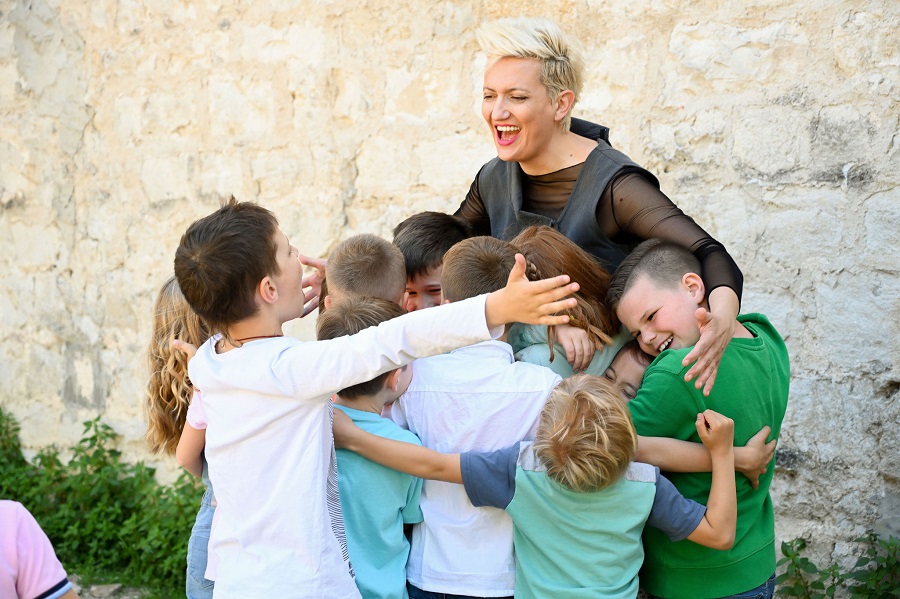
Curious about the news that Harfa is expanding and opening an international kindergarten as well as a high school alongside the current elementary school, we paid them a visit again. We wanted to find out more details and learn about how they achieve excellent academic results in a way that is so different from other schools.
- Yes, it is true that in addition to the elementary school, we are opening an international kindergarten as well as a high school. We are excited because we received excellent feedback during the visit from the international IB audit. Motivated by their encouragement, confirming that our methods are the right ones, starting the next school year, we are expanding. We follow the international IB Primary Years Program (PYP), balancing it with the Croatian curriculum. In addition to regular classes in the morning, our students have regularly scheduled lunch and two snacks, additional time for studying and writing homework, as well as additional workshops such as drama, chess, mental arithmetic, STEM workshops, music workshops, and individual workshops, depending on the needs. Our goal is to achieve learning outcomes in an interesting and student-oriented way. Our methods are based on inquiry-based teaching, research, projects and teamwork, hands-on learning, but above all, on building strong connections between students and teachers who serve as mentors, while students take responsibility for reaching the classroom goals on a daily, weekly, monthly and annual level. We teach them to understand the importance of life-long learning and to recognize the power of their responsibility in achieving all life goals, including school goals. – we learn this from the school principal Antonia Tomas.
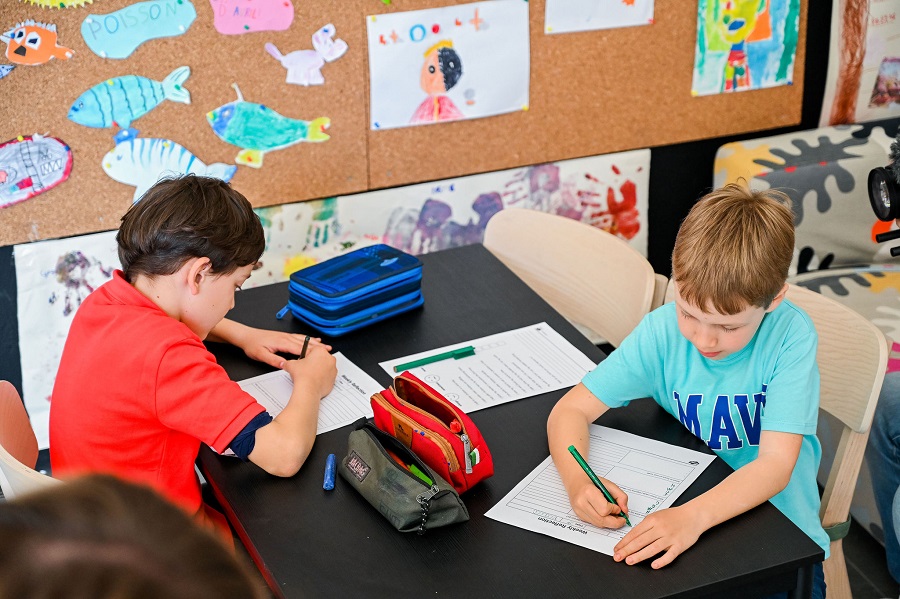
While listening to her explanations and the exciting news about spreading the school offer, we hear the students loudly calling out to their teacher. We find out that they are third-graders who do not allow the teacher to end the lesson until they are done with their plans for the day.
- See, this is the result of allowing children to be co-creators of the lesson plans. Every Monday morning, following the curriculum and the learning outcomes, they plan when and how they will learn about a certain unit. You can see their plan right there on that wall. This is what they have committed themselves to. What do you think; will they skip something? No way! No one wants to leave until the plan is fully executed. – explains the school principal.
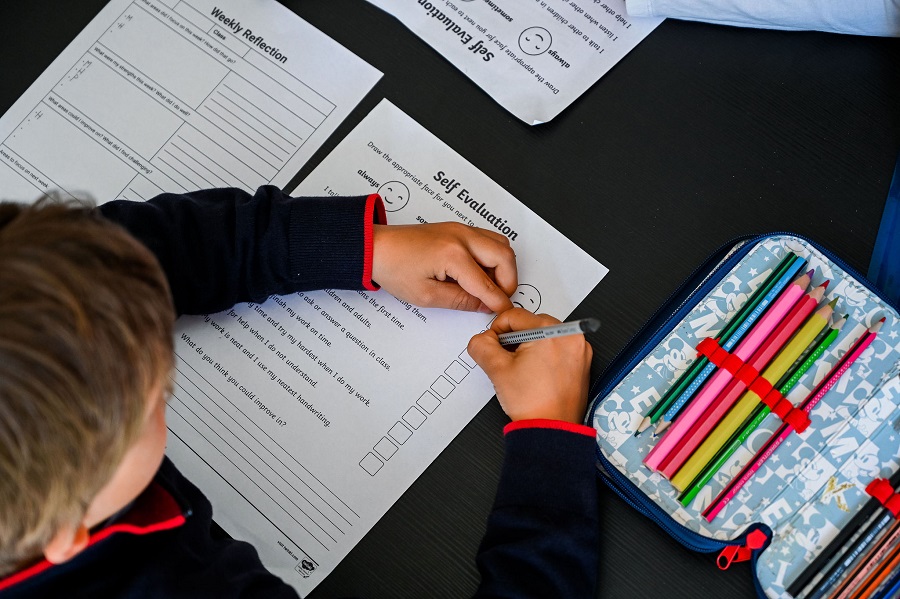
- It’s so inspiring seeing children from different cultures communicating fluently in two languages. As an international school, the official language of communication is English, but the children also learn Croatian. It is interesting to see foreigners wanting to learn the Croatian language with great interest and our children helping them in this. In addition, they have enough free time to play and communicate, and they acquire languages very quickly. Seeing a child who recently came from abroad and now speaks Croatian fluently or a Croat who didn't speak English at all and now communicates in that language without any barriers is daily proof of how quickly children acquire knowledge. - explains Dubravka Šušnjara, a first-grade teacher who recently moved from Australia.
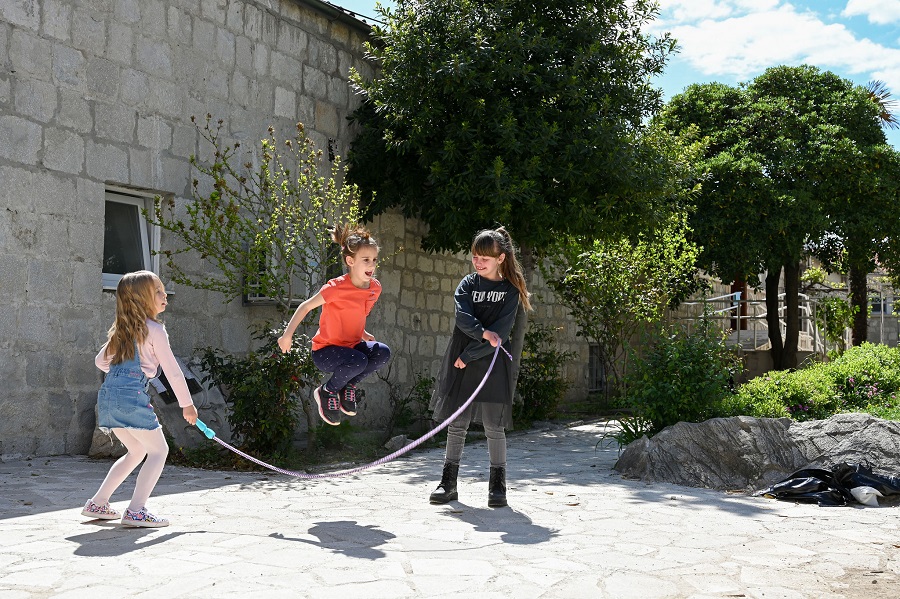
We are interested in her experiences in Australia and in Croatia. Which one is better? But she just waves her hand and adds – This is really the center of the world. With Split as a city tailored for a balanced life and this kind of education, we didn't think twice. My husband and I decided to return after 12 years, and the main reason was precisely the fact that there was a school like this here. As I am a teacher myself, I also applied for an open position in the school this year. I am grateful that my child, as well as myself, have the opportunity to be a part of such a change in education. - concludes teacher Dubravka.
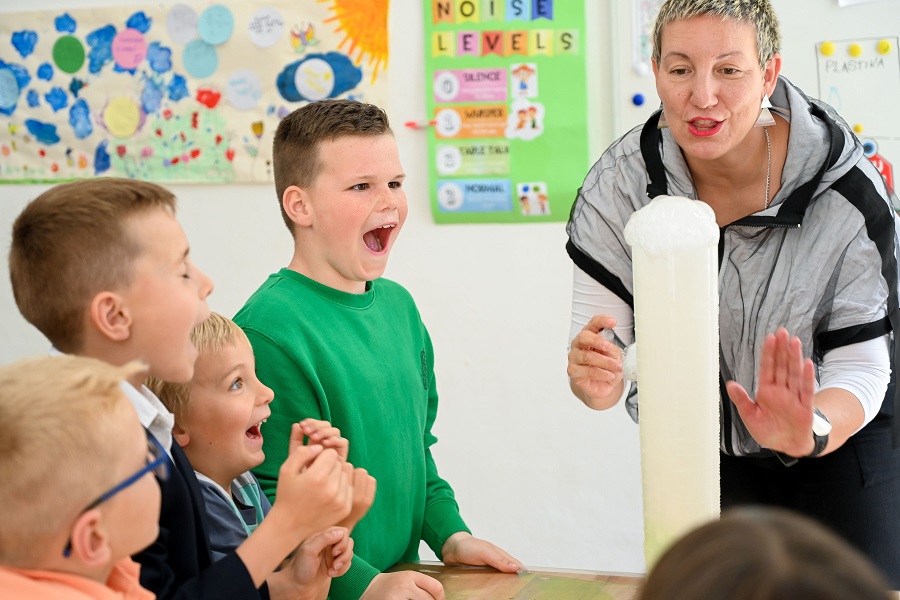
We have already written about Harfa International School. What started as an enthusiastic project founded by Harfa - the publishing company, turned into a global example of excellent practice. During the preliminary application, they tell us, for the prestigious international "IB Primary Years Program (PYP)" which was planned only for the future, the international audit gave Harfa the highest marks and suggested entering the accreditation process immediately. This is how a small private school from Split became an international example of excellence in education.
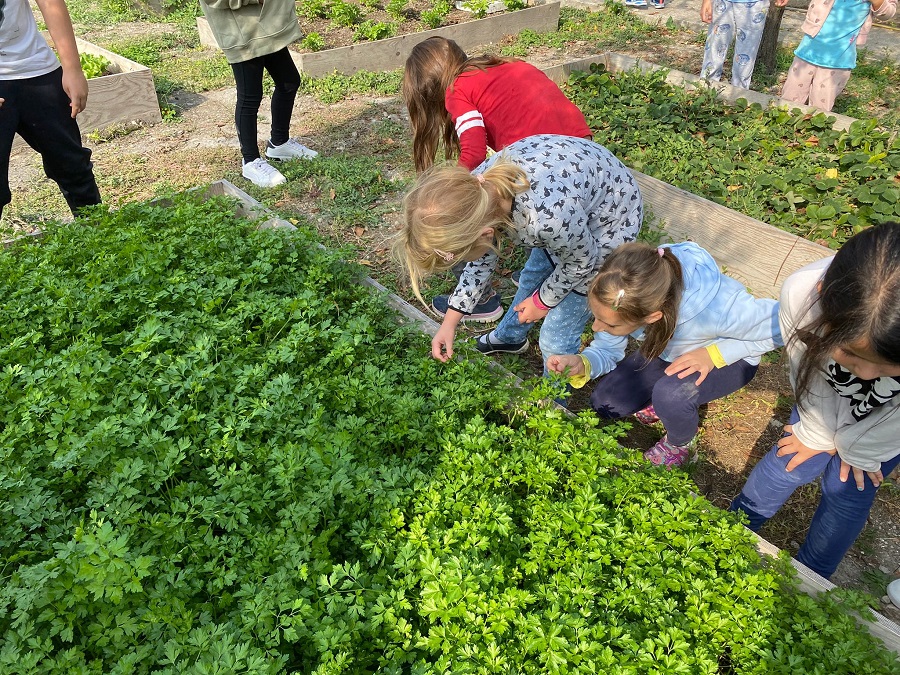
The person behind this inspiring story is Irena Orlović - a psycho-social counselor and one of the main protagonists of Mastercard's short documentary films FIVE, about female entrepreneurs who have changed the world. Irena was chosen as a representative for Europe, and her inspiring story from Croatia was followed by millions of viewers around the world. After 17 years in publishing books by the world's most famous authors in the sphere of children’s socio-emotional development, parenting, and mental health in general, through the award-winning web application Pametnica for the development of children's potential and series of educational workshops for parents, teachers, pedagogues... Irena has decided to turn her rich experience into a school in order to set an example that educational reform, in the best possible way, is very possible in practice.
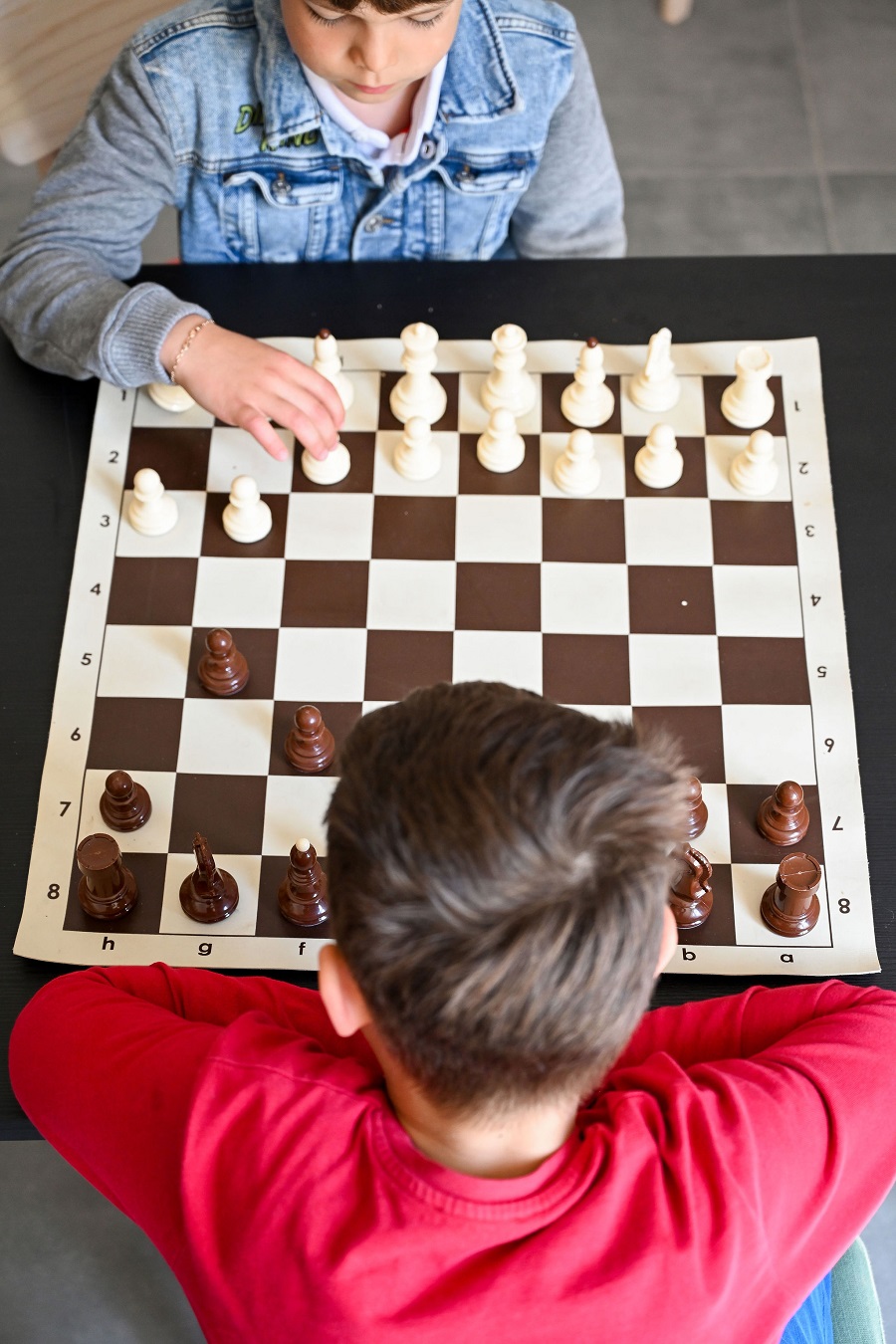
- Many refer to the successful "Finnish" model of education. - Irena tells us. - Some things are culturally determined, and some took years of work to change. Finland, too, carried out its reform more than 20 years ago at a time when it was clear that the same path was no longer sustainable. Some other models in the world can also be analyzed, and we can learn something from all of them. This is what we do at Harfa International School. We collect the best world practices, both scientific research about a child’s well-being, as well as best school practices, and we adapt them to our needs. The third generation is underway, and I can only say that we are very excited about the results we see every day.
We are often asked if the children in our school have grades. The grades exist, but the students are self-reflecting with the support of the teacher-mentor. I want to highlight that our world does not revolve around grades. Our world revolves around creating quality relationships between teachers and students, around strengthening that trust as a basis for everything else. At the end of the year, the children give their own opinion about which grade they deserve. Don't fall into the trap of thinking they are giving themselves the highest grades. They are very self-critical and their conclusions are rarely different from reality. This is how we teach them to take responsibility for their actions from an early age. Our goal is to encourage curiosity and develop a passion for learning through research, practical work, and projects, by connecting information with real-life situations. We prepare children for the future where they will be ready for all the challenges they will have to face, and this is the essence of education, isn’t it? – Irena Orlović ends her story seriously.
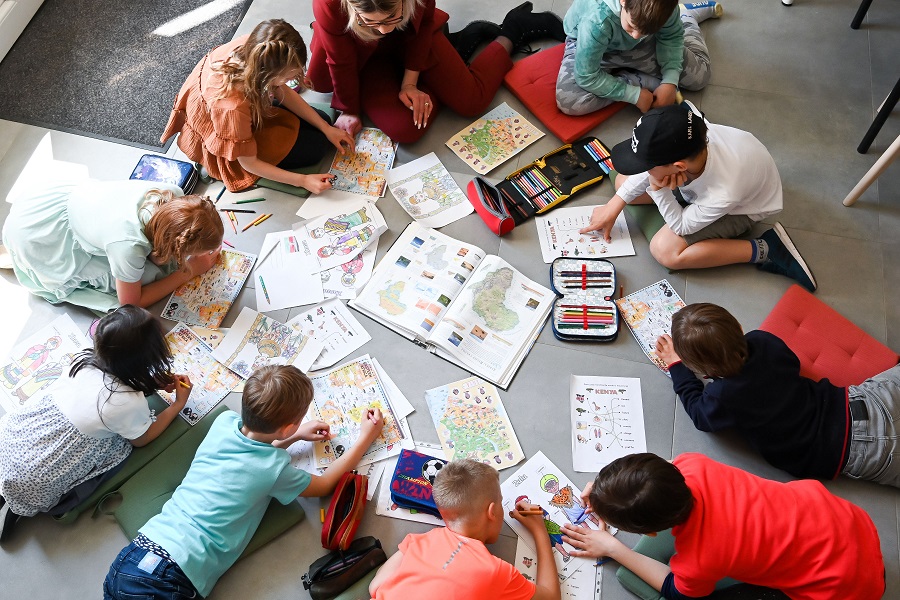
We are interested in learning how long it takes for children to be able to give themselves an objective assessment.
- People do not function "at the press of a button!" Everything I mentioned earlier requires a lot of work and patience. And, of course, trust in teachers. I know it's hard to accept a different path when we have expectations that have been imprinted in our heads for generations. But, it is clear to all of us that we do not all have the same "settings". Someone will get to the destination in one way, others in a different way. The point is that everyone will reach their goal, which is the fulfillment of their full potential. And trust me, this will happen if they are offered the space and the right means to do so. - she explains.
While we are talking, children approach us with trays of food. Today, along with a salad, they have polenta and tomato sauce on the menu.
- We plan the menu in cooperation with nutritionists, but many children have already learned in their families that healthy is better. Try them! Offer them chocolate and an apple and let's see which one they will choose! - laughs Irena. We don't even need to check, we see that they would choose the healthy option. It is very clear that this school is trying its best to make the students fall in love with studying.
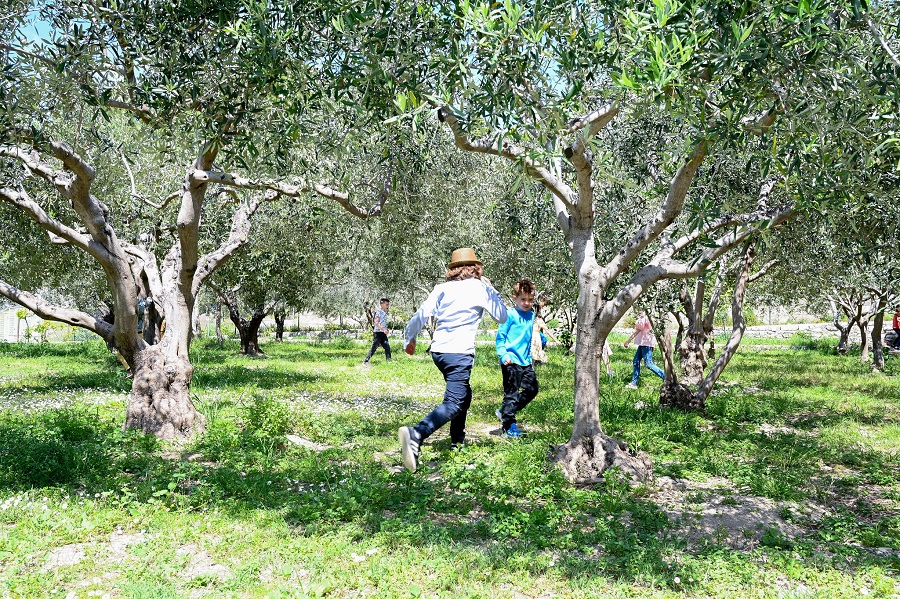
- Yes, we want children to like learning. Our goal is to make inquiry learning and knowledge acquisition their passion. We do not want to instill dry facts in them because the brain remembers what is interesting and important. To some, it looks like we are just playing with the children, but science has proven that this way is more effective in the long run. Let's look around. Take a look at your own children. Do they remember better when they "learn by heart" out of a book or when you tell them an interesting story, play with them, do some research with them and connect information with real-life situations familiar to them? There isn't even much wisdom there. Changes in education only require a lot of self-motivation and an effort to connect with children in a way that is in line with their needs. Yes, the challenges of technology and its impact are not negligible, but wasn't that the case throughout various historical periods in times when changes were made? - explains Irena.
Through children’s laughter, we hear a barely perceptible echoing sound. Suddenly, silence. Irena quietly explains: - Children know when it's time to play and when it's time to concentrate and study. When they hear this vibrating bell, it's time to learn.
The drama workshop will start soon.
- Through drama, they develop presentation skills, face the fear of public speaking, practice self-confidence, memory, concentration... and many other things. To be ready for the future, we should start on time and without pressure, through the game. The same thing is with the other workshops. Chess, mental arithmetic, STEM workshops, music workshops, debates, mental health empowerment workshops, entrepreneurship workshops... each of these workshops is carefully designed to support the learning outcomes, but also the development of soft skills and knowledge needed to face the challenges of the future.
- I used to believe that the same and even better results could be achieved differently from what we had in our traditional education system. Now, I have no doubts about it at all. Three classes at Harfa International School prove that every day. The point of education is to get to know each child, what makes them happy and motivated, and to support them in that. Therefore, I decided that for the next school year, we will open a school center where we will follow our children on their life path from the age of 3 to 18. We are now in the process of opening a kindergarten and a high school, in addition to the existing elementary school according to our program. – explains Irena Orlović, and the slogan of her school is "School for the Future".
Learn more about Harfa International School on the official website.
Proposal to Amend Foreign Qualifications Recognition Act
ZAGREB, 3 Feb 2022 - The proposal to amend the Foreign Qualifications Recognition Act provides for the recognition of post-secondary school education that is not part of the higher education system, Science and Education Minister Radovan Fuchs said at a cabinet meeting on Thursday.
The existing law does not provide for the recognition of foreign regulated professions and is not harmonised with strategic EU documents, so it was necessary to draw up the new proposal, the minister said. The new law is expected to facilitate access to the labour market for skilled labour and provide protection from poor qualifications, he added.
The recognition of foreign qualifications would be done by the Agency for Science and Higher Education, the Agency for Vocational Education and Training, and the Education and Teacher Training Agency.
The recognition of qualifications obtained abroad for the purpose of continuing education in Croatia would be carried out by education institutions where further education will be pursued.
For more, check out our politics section.
Croatian Education Vouchers Worth 10,000 Kuna to be Issued in April
January the 17th, 2022 - Croatian education vouchers are set to be sent out to both employed and unemployed people in the amount of 10,000 kuna, as new technologies and new ways of doing things become more and more frequent.
As Poslovni Dnevnik/Nikolina Petan writes, new technologies require the creation of new jobs, which can result in a number of disruptions, as a number of workers have to change careers, leading to an even more pronounced mismatch between supply and demand on the labour market.
The gap between need and supply is one of the main long-term problems of the Croatian labour market, which the relevant institutions are trying to solve through various measures. As suc, back at the end of December last year, Croatian Parliament passed amendments to the new Adult Education Act, and earlier this year the CES adopted new Active Employment Policy Measures for 2022, which include both the unemployed and the employed. The new measures include something called Croatian education vouchers.
Among these measures, which will encourage employment, self-employment, education and training, and ultimately stimulate economic growth through green and digital methods, include on-the-job training and education in various adult education institutions.
One of the key challenges to acquiring skills is the very low participation rate of Croatian adults in lifelong learning. The aim of these new measures is, therefore, to enable the greater participation of both unemployed and employed persons in lifelong learning with an emphasis placed on acquiring skills related to the green and digital transition and to provide employers with a quality workforce.
"Although there are more than 600 registered adult education institutions across the Republic of Croatia that implement or have implemented more than 11,000 educational programmes, there was no defined quality assurance system that would ensure quality and effective education focused on individual and labour market needs.
According to the former legal solution, adult education institutions received a decision from the Ministry of Science and Education to implement formal adult education programmes of unlimited duration, which resulted in programmes that were methodologically and substantively outdated, and sometimes inconsistent with changes in regulations from individual areas, which couldn't always guarantee an adequate level of quality.
In the system of adult education, there were still many problems in the implementation of adult education, which certainly shouldn't have happened, given the importance of an entire sector in which adjustment to the labour market is important.
Through the adoption of the new Adult Education Act, significant changes were introduced in the education system at the end of last year, especially when it comes to the harmonisation of educational programmes with the needs of the labour market and the quality of the implementation of said educational programmes.
The intention of the state is to reach the EU average in adult education by 2030, because Croatia is currently at 3.5 percent, while the EU average is a far higher 10.8 percent. Amendments to the law were needed to better respond to labour market needs and help gain better social status through adult education,'' said Tomislav Katic, director of the recently opened Orsus University and owner of the Orsus Group, one of Croatia's leading security management companies.
One of the most important measures of the Law on Adult Education and the first document that legally regulates the announcement of the government's National Recovery and Resilience Plan (NPOO) is related to the issuance of Croatian education vouchers for education of 30,000 employed and unemployed people over the next three years. According to the bill, these Croatian education vouchers will be used for both formal and non-formal education programmes in order to facilitate access to the labour market, and the funds for it have been withdrawn from EU funds.
This financial instrument for the allocation of public funds for adult education will be awarded on the basis of the Adult Education Agreement, and its value for individual adult education is on average 10,000 kuna per person, meaning that the measure is planned to cover 30,000 people. The exact amount of Croatian education vouchers issued will be determined depending on the sector in question and the duration and complexity of the selected education programme, which will depend on the final elaboration of price scaling.
Legislative framework for establishing a Croatian education voucher system
"MROSP has defined about 60 required skills with an emphasis on the green and digital transition. By April this year, an improved skills catalog will be developed - that is, a list of skills needed to do a particular job. The Law on Adult Education introduces the notion of acquiring micro-qualifications, which is the basis for shorter educational programmes,'' explained Katic.
The establishment of the ORSUS College was a logical sequence of developing the business of the ORSUS Group through education in economic activities that require specific knowledge and skills and which, through practice, have been recorded as a shortage in the domestic labour market.
For more, check out our dedicated lifestyle section.
Andrej Plenkovic Visits Novska Gaming Campus, New Student Dorms
January the 14th, 2022 - Novska is having a complete and utter turnaround, becoming the Novska gaming campus which has just recently been put into function, as have new student dorms.
As Poslovni Dnevnik/Suzana Varosanec writes, it has been less than two years since Novska's former INA building was transferred to the portfolio of that city, which is rapidly positioning itself as the centre of the gaming industry in Croatia. The new building has been put into a new function by being transformed into new student dorms.
This has been a joint project of the City of Novska, Sisak-Moslavina County and the Croatian Government, which was officially opened this week by Prime Minister Andrej Plenkovic, who made sure to emphasise that this is just one project which is transforming Novska into the country's gaming centre as the industry of the future.
Two business incubators are playing host to more than 60 companies specialising in video games, while over 50 percent of the companies engaged in the gaming industry are registered in Novska where young people just keep on coming, which is the nucleus of development and new positioning of the city and the wider county.
In the specific case of the second student dormitory in this county, the education department has a prominent role, which verified a new subject for Novska's students - training to become technicians for video game development, resulting in the need to open the aforementioned student dormitory.
More than half of the students enrolled in this subject of study come from outside of the area, and 21 students will be the new tenants of the new building. According to Prefect Ivan Celjan, there is a recognition of the education and needs of today's students, but also the efforts of parents who are trying to achieve better conditions for their children. Owing to the deep understanding of the above, the student dorms will be fully funded, which means they'll be free of charge for end users.
The new dorms will house students from all over Croatia from Zagreb, Dugo Selo, Bjelovar, Kutinska Lipa, Stari Petrovo Selo, Kumrovec, Bektez, Koprivnica, Vodnjan and beyond, while the interest in the new field of study is unsurprisingly huge given the popularity of video games and the Novska gaming campus.
The Croatian Government has raised subsidies for entrepreneurs to the maximum (within the programme of the reconstruction and revitalisation of the local economy after a series of catastrophic earthquakes at the end of 2020) and this concept is being carried out in cooperation with the CES, being considered a magnet for young people who will come to Novska and hopefully decide to stay following their studies.
For more, check out Made in Croatia.
Croatia and Hungary Sign Programme of Cooperation in Education and Science
ZAGREB, 24 June 2021 - Croatian Minister of Science and Technology Radovan Fuchs and Hungary's Minister for Human Resources Miklós Kásler on Thursday signed a program of cooperation in education and science for the period 2021 to 2025.
"The document additionally testifies to the exceptionally good, friendly, harmonic relations between Croatia and Hungary. The centuries-long history of our two peoples comes to full expression in cooperation and friendly relations," said Minister Fuchs.
He underscored that the way the issue of the Hungarian minority in Croatia and the Croatian minority in Hungary, all the rights that national minorities enjoy, is definitely an example of how relations between minorities could be resolved in other EU countries.
"This program opens further possibilities for cooperation, additional elements that will improve what we have been trying to do this entire time, to preserve the cultural and national identity of our national minorities," Fuchs said.
The program adds a new element to that cooperation. Each country will send their teachers, not members of national minorities but native speakers, to improve and advance courses in their mother tongue.
Fuchs thanked the Hungarian government for its aid to earthquake-struck areas in Croatia, particularly for the construction of a new elementary school in Petrinja.
Kásler: Both governments attach great importance to public education, the inclusion of minorities in education
Minister Kásler underscored that bother governments attach great importance to public education and the inclusion of national minorities in their own education and culture.
That cooperation exists equally between institutions, students, and teachers, he said.
"This is a beautiful and important station in development and cooperation. Just like Hungary has done for the Croatian minority, Croatia has expanded the possibilities in public education for the Hungarian minority. This is a symbolic step, but it is also very important because it enables that one country provides help for the other," said Minister Kásler.
In that context, he said that since 2010 Hungary has increased its financial investments by three and a half times, from the initial 1.8 billion forints (€5.1 million) to 10 billion (€28.5 million) now.
"We have to discuss material matters that will enable good functioning but I consider that content is just as important. We have 800 years of joint tradition and history, living in peace and allowing coexistence and survival in difficult times," he said.
For more about politics in Croatia, follow TCN's dedicated page.
Croatian Algebra Awards Scholarships Worth More Than 500,000 HRK
June the 1st, 2021 - The Croatian Algebra educational institution is offering scholarships for its MBA programme which exceed the very handsome amount of 500,000 kuna.
As Novac writes, the final presentation of the candidates who have applied, the team work on this assignment and then the announcement of the most successful scholarship holders ended the scholarship competition of the Croatian Algebra University this past weekend.
The above competition involved candidates who were given the opportunity to win full and partial scholarships for the only e-Leadership MBA programme in Croatia and the wider area. It involves teaching modules imbued with topics related to the digital transformation and the industrial revolution 4.0, the Croatian Algebra University said.
The partner of the final day of the competition was one of the most innovative global marketing companies, Red Bull, whose experts prepared a challenging business case to be solved by Algebra's scholarship candidates. The mentors available to the teams were Hrvoje Martic (Infodom), Luka Maricic (Superology), Filip Petrovic (JGL), Mario Pavic (Five), Juraj Zlof (GrowthFix), Petra Stojanov (Algebra LAB) and Zeljko Riha (Riha & Stamac).
As part of this year's competition, one full scholarship, one scholarship in the amount of half the tuition fee and ten partial scholarships were awarded. Although the applications for the scholarship competition were individual, on the scholarship day itself, the candidates competed in teams, so that, in addition to individuals, members of the three best placed teams also won partial scholarships for MBA studies at the Croatian Algebra University.
The candidates, who were divided into teams, voted for the performances of other teams and solutions to the aforementioned Red Bull business challenge that they liked the most. Members of the winning team, "Arima One", won scholarships for the MBA programme in the amount of 35,000 kuna per candidate, the second-placed team "Running Cord" was offered scholarships in the amount of 30,000 kuna, while the third-placed team, "Divas", was awarded scholarships in the amount of 25,000 kuna per candidate.
The jury will then award the most valuable prizes, a full scholarship for the MBA programme in the amount of 135,000 kuna, as well as all remaining partial scholarships this year, after further analysis of individual performances in the coming days due to the complexity of the evaluation process and the very good presentations of the candidates with their project solutions. The jury of this year's scholarship competition consists of members of the MBA team of the University of Algebra - Goran Radman, Maja Dujlovic, Arsen Solic and Natasa Soic.
"We believe that our vision of upgrading the classic MBA study with topics related to the digital transformation and the industrial revolution 4.0 is becoming more and more real every year, with each new generation of students.
The great interest we've seen from the candidates for this year's scholarship competition as well as the great successes achieved in the business sphere and in the careers of our previous candidates, as well as our current students and graduates, show that this MBA programme has successfully responded to the challenge of educating people for leadership and management skills, but also that it inspired them to creatively apply digital technologies with the goal of digitally transforming the business of their companies. We'd like to congratulate all of the scholarship holders on their scholarships and we believe that they'll also represent a step towards significant progress in their careers,'' emphasised Arsen Solic of the Croatian Algebra University.
The Algebra MBA scholarship competition is otherwise, and traditionally, a fantastic opportunity for business networking. The final competition, which sees the solving of a specific business challenge, attracts people in similar career positions in some of the best Croatian and international companies. As the Algebra MBA e-Leadership programme combines knowledge and skills from the fields of business management, managerial skills and knowledge of digital technologies, as well as the implementation of digital transformation, its participants are usually those who require some of these skills - and their synergy effect - for further advancement and to take new, leading positions in their companies.
For more, follow our dedicated lifestyle section.
EC Approved More than €150 Million to Integrate Innovative Digital Technologies in Croatia's Education System
November 18, 2020 - According to the EU Cohesion policy, the European Commission has approved an investment worth more than €150 million from the European Regional Development Fund (ERDF) and the European Social Fund (ESF) to integrate innovative digital technologies in Croatia's education system.
The project e-Schools will roll out a comprehensive ICT infrastructure, provide state-of-the-art IT equipment, develop educational software and connect students and teachers in 1166 public primary and secondary schools throughout the country. CARNET’s regional hubs in Zagreb, Osijek, Rijeka and Split, as well as county hubs, will be upgraded. Schools will get computers, and every school will have an interactive classroom with an interactive display and tablets for students and other equipment according to their needs. This unique national network will improve conditions for teaching and learning and make the management of schools more efficient and transparent. At the same time, students and teachers will benefit from targeted training to upgrade their e-skills. The project is worth more than €177 million, and over €150 million are EU funds.
Commissioner for Cohesion and Reforms, Elisa Ferreira, commented: “Thanks to EU Cohesion policy, Croatia's education system will be able to fully reap the benefits of the digital era and better prepare young people for their professional future. This project also contributes to boosting the resilience of the sector during the coronavirus pandemic.” The project builds on a successful pilot phase, which has already helped over 150 Croatian schools to switch to a new level of education. It also received the award for ‘Skills & education for a digital Europe', which has helped 10% of Croatian schools and around 50,000 teachers and 500,000 students to switch to a new level of education. In the current programming period 2014-2020, Cohesion policy is investing in Croatia €8.5 billion in boosting competitiveness, sustainability and improving the quality of life of Croatian citizens. A factsheet is available here.
To read more about lifestyle in Croatia, follow TCN's dedicated page.
Online Schooling in Croatia Due to Coronavirus: A Teacher's Viewpoint
March 19, 2020 - Online schooling in Croatia has replaced regular school for an initial two weeks due to the coronavirus crisis. Some reflections from the viewpoint of a dedicated teacher.
When a letter arrived from the Ministry of Science and Education last week to start distance education in Istria from Monday, we knew what was waiting for us in other parts of Croatia.
We quickly decided on which platform to use for online teaching at our school, added students and teachers to virtual classes, lent tablets and mobile cards to students from low-income families so that everyone could successfully follow classes with the help of ICT.
Helping each other out, we prepared first-hand teaching materials and devised backup plans and strategies to work from home every day. New circumstances imposed new rules and made us turn into teachers on the other side of the screen overnight.
Unfortunately, many colleagues from other schools still need to be present at schools in their workplaces. These are still unbelievable instructions by competent ministry directors. Every presentation, departure, and commute to work increases the risk of infection, and someone above us just can't figure it out.
And while one education adviser says 150,000 students have forgotten their passwords and crashed virtual platforms that students cannot log in to, it is simply a well-known situation that we teachers relive year after year, for example, when printing student certificates. And while they boast that we do so much better than other wealthier countries, I have to admit that I'm not so sure about that. My colleagues in Norway tell me that they have no problems with logging in to the system all day. A colleague from Turkey is surprised that in this situation, we are still required to be at work. They, too, are tired just like us, but at least their education ministers do not tell them that they have to come to school to learn to work online and, in collaboration with colleagues, be better prepared to work from home.
In communication with students, I see how frustrated many are that they are unsuccessfully trying to login to a system that has never been designed to handle such traffic and workload. My cellphone rings and messages come from all over, and I just can't help the students and their parents with any login issues. I try to calm them down, as always, and as the days go by, we will already get used to these existing problems.
Fortunately, I work in two small schools where we continue to encourage each other and share experiences, just as we do in teaching groups on social networks where we are from all over Croatia. We are aware that online teaching will not be as good as teaching in normal circumstances, but we do our best.
Although behind-the-scenes, friendly, kind and willing to help, we're still here for our students who may miss a class (be it on TV or in a virtual classroom), but we're sure everyone will get more important life lessons not written down in school books.
The views expressed in this article are solely mine and do not represent the views of either of the two schools in which I work.
For the latest on the coronavirus crisis, follow the dedicated TCN section.
Almost 10.000 Undergraduate Students to Enrol in Graduate Studies
Student enrolment in Croatia. A look at the coming year.


